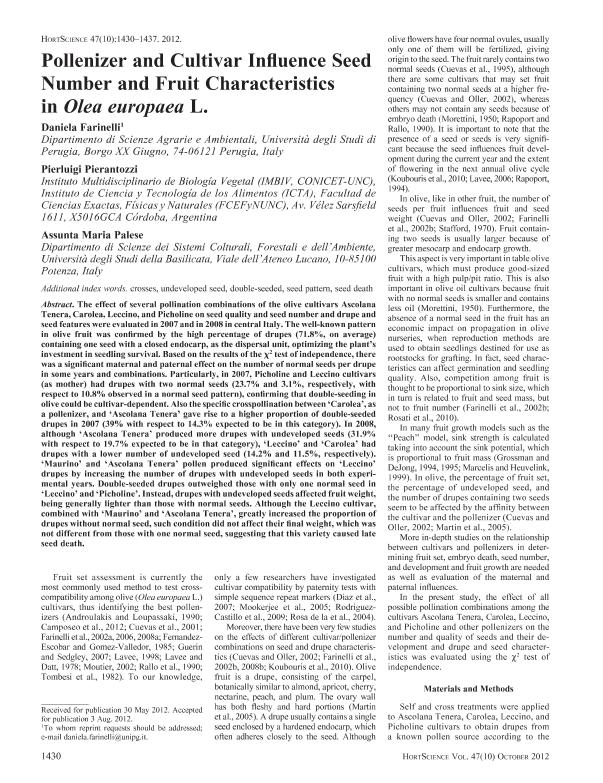Artículo
Pollenizer and Cultivar Influence Seed Number and Fruit Characteristics in Olea europaea L.
Fecha de publicación:
10/2012
Editorial:
American Society for Horticultural Science
Revista:
Hortscience
ISSN:
0018-5345
Idioma:
Inglés
Tipo de recurso:
Artículo publicado
Clasificación temática:
Resumen
The effect of several pollination combinations of the olive cultivars Ascolana Tenera, Carolea, Leccino, and Picholine on seed quality and seed number and drupe and seed features were evaluated in 2007 and in 2008 in central Italy. The well-known pattern in olive fruit was confirmed by the high percentage of drupes (71.8%, on average) containing one seed with a closed endocarp, as the dispersal unit, optimizing the plant's investment in seedling survival. Based on the results of the x2 test of independence, there was a significant maternal and paternal effect on the number of normal seeds per drupe in some years and combinations. Particularly, in 2007, Picholine and Leccino cultivars (as mother) had drupes with two normal seeds (23.7% and 3.1%, respectively, with respect to 10.8% observed in a normal seed pattern), confirming that double-seeding in olive could be cultivar-dependent. Also the specific crosspollination between 'Carolea', as a pollenizer, and 'Ascolana Tenera' gave rise to a higher proportion of double-seeded drupes in 2007 (39% with respect to 14.3% expected to be in this category). In 2008, although 'Ascolana Tenera' produced more drupes with undeveloped seeds (31.9% with respect to 19.7% expected to be in that category), 'Leccino' and 'Carolea' had drupes with a lower number of undeveloped seed (14.2% and 11.5%, respectively). 'Maurino' and 'Ascolana Tenera' pollen produced significant effects on 'Leccino' drupes by increasing the number of drupes with undeveloped seeds in both experimental years. Double-seeded drupes outweighed those with only one normal seed in 'Leccino' and 'Picholine'. Instead, drupes with undeveloped seeds affected fruit weight, being generally lighter than those with normal seeds. Although the Leccino cultivar, combined with 'Maurino' and 'Ascolana Tenera', greatly increased the proportion of drupes without normal seed, such condition did not affect their final weight, which was not different from those with one normal seed, suggesting that this variety caused late seed death.
Palabras clave:
crosses
,
undeveloped seed
,
double-seeded
,
seed pattern
Archivos asociados
Licencia
Identificadores
Colecciones
Articulos(CCT - MENDOZA)
Articulos de CTRO.CIENTIFICO TECNOL.CONICET - MENDOZA
Articulos de CTRO.CIENTIFICO TECNOL.CONICET - MENDOZA
Citación
Farinelli, Daniela; Pierantozzi, Pierluigi; Palese, Assunta Maria; Pollenizer and Cultivar Influence Seed Number and Fruit Characteristics in Olea europaea L.; American Society for Horticultural Science; Hortscience; 47; 10; 10-2012; 1430-1437
Compartir
Altmétricas




